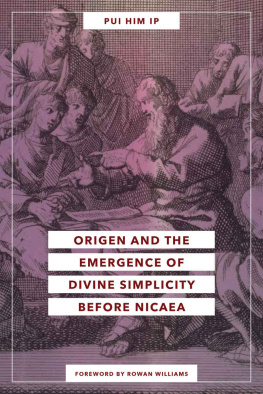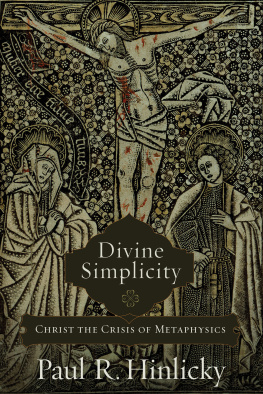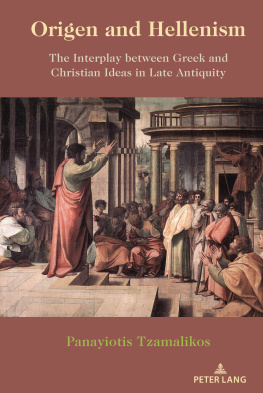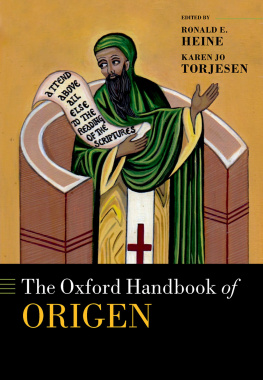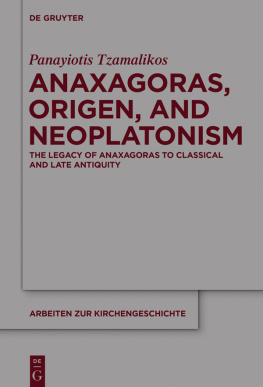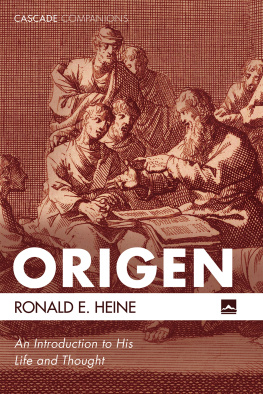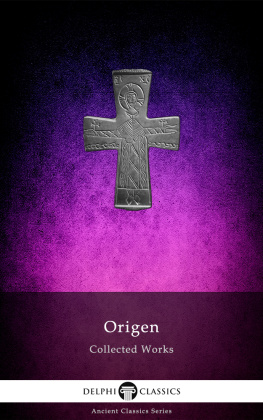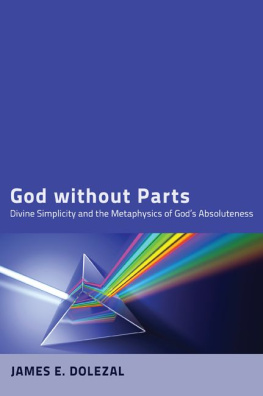Pui Him Ip - Origen and the Emergence of Divine Simplicity before Nicaea
Here you can read online Pui Him Ip - Origen and the Emergence of Divine Simplicity before Nicaea full text of the book (entire story) in english for free. Download pdf and epub, get meaning, cover and reviews about this ebook. year: 2022, publisher: University of Notre Dame Press, genre: Religion. Description of the work, (preface) as well as reviews are available. Best literature library LitArk.com created for fans of good reading and offers a wide selection of genres:
Romance novel
Science fiction
Adventure
Detective
Science
History
Home and family
Prose
Art
Politics
Computer
Non-fiction
Religion
Business
Children
Humor
Choose a favorite category and find really read worthwhile books. Enjoy immersion in the world of imagination, feel the emotions of the characters or learn something new for yourself, make an fascinating discovery.
- Book:Origen and the Emergence of Divine Simplicity before Nicaea
- Author:
- Publisher:University of Notre Dame Press
- Genre:
- Year:2022
- Rating:3 / 5
- Favourites:Add to favourites
- Your mark:
- 60
- 1
- 2
- 3
- 4
- 5
Origen and the Emergence of Divine Simplicity before Nicaea: summary, description and annotation
We offer to read an annotation, description, summary or preface (depends on what the author of the book "Origen and the Emergence of Divine Simplicity before Nicaea" wrote himself). If you haven't found the necessary information about the book — write in the comments, we will try to find it.
Pui Him Ip: author's other books
Who wrote Origen and the Emergence of Divine Simplicity before Nicaea? Find out the surname, the name of the author of the book and a list of all author's works by series.
Origen and the Emergence of Divine Simplicity before Nicaea — read online for free the complete book (whole text) full work
Below is the text of the book, divided by pages. System saving the place of the last page read, allows you to conveniently read the book "Origen and the Emergence of Divine Simplicity before Nicaea" online for free, without having to search again every time where you left off. Put a bookmark, and you can go to the page where you finished reading at any time.
Font size:
Interval:
Bookmark:
ORIGEN AND THE EMERGENCE OF
DIVINE SIMPLICITY BEFORE NICAEA
ORIGEN AND THE
EMERGENCE OF
DIVINE SIMPLICITY
BEFORE NICAEA
PUI HIM IP
Foreword by Rowan Williams
University of Notre Dame Press
Notre Dame, Indiana
Copyright 2022 by the University of Notre Dame Press
Notre Dame, Indiana 46556
undpress.nd.edu
All Rights Reserved
Published in the United States of America
Library of Congress Control Number: 2022935752
ISBN: 978-0-268-20361-0 (Hardback)
ISBN: 978-0-268-20363-4 (WebPDF)
ISBN: 978-0-268-20360-3 (Epub)
This e-Book was converted from the original source file by a third-party vendor. Readers who notice any formatting, textual, or readability issues are encouraged to contact the publisher at
For Natasha
CONTENTS
FOREWORD
Analysing how the earliest Christian writers set out to define and refine their concepts is an exercise that has been repeatedly reworked over the past two centuries. The once popular model of a Babylonian captivity imposed on the simple gospel by Hellenistic habits of mind has almost entirely disappeared from serious scholarship. A growing sophistication in our understanding of what happened to Greek philosophy in the first centuries of the Christian era prompted some more careful study of how the themes and vocabulary of that philosophy were digested and adapted, often in startlingly innovative ways, by Christian thinkers. The notion that patristic theologians, Greek and Latin alike, were either derivative or inept readers of philosophical texts has been very properly challenged, and the intellectual respectability and interest of Christian variations on their themes has been brought out (we might think here of Richard Sorabjis work on cosmology, for example).
But the present study, by one of the most promising theological scholars of his generation, takes this a stage further. When we encounter a discussion in patristic literature of a topic we might categorize as metaphysical, we should beware of rushing to the conclusion that it is merely a Christian contribution to an ongoing philosophical debate. Patristic theologians undertake the labor of conceptual clarification with two main and related aims in mind: to provide a toolkit for reading the authoritative text of Scripture and to do so in such a way as to make sure that Scripture is read in a way congruent with the basic logic of how the infinite God must be spoken of if we are to avoid idolatrous and trivializing accounts of divine life and agency. Faced with a treatment of some apparently philosophical problem, we need to ask, Exactly what exegetical pitfalls is this meant to help us avoid? And because speaking nonidolatrously of God is fundamental to our spiritual well-being, we need equally to be alert to what specific ethical and spiritual temptations have to be circumvented and what turns of phrase give unacceptable room to such temptations.
This book offers an exemplary close reading of language about divine simplicitythe metaphysical assumption that the divine life cannot involve any sort of plurality or divisibility. That this is in some tension with claims about Trinitarian doctrine is a familiar issue, and there have been some sound studies of how this is dealt with in the post-Nicene period. But when pre-Nicene writers discuss divine simplicity, they have in mind a set of errors that must be avoided, hermeneutical dead ends that need to be ruled outand ruled out not only because of conceptual incoherence but because of their effect on the coherence of the life of prayer and discipleship. As Pui Him Ip shows, Trinitarian language is itself, in the thought of the greatest of pre-Nicene thinkers, Origen of Alexandria, bound up with precisely this concern to provide a defensible way through some of the complications around simplicity and plurality. Unless we understand the very particular questions he is asking, we shall just repeat the mistakes of later Greek (and modern) theologians in writing off Origens Trinitarian scheme as an unhappy and inconsistent mlange of proper theological reflection and dubious Middle Platonic tropes. The argument of these pages urges, among much else, a more imaginative and generous reading of the great Alexandrian without suggesting that post-Nicene theology needs rewriting.
This is a study of admirable clarity and freshness, raising very substantial questions around method in patristic studies, the history of our histories of early Christian thinking, and the range of constraints that shape an agreed Christian grammar for speaking of the God of Jesus Christ. It will surely be recognized as a really significant contribution to its subject, necessary reading for serious students both of patristics and of the wider history of Christian thought.
Rowan Williams
Cardiff, August 2021
ACKNOWLEDGEMENTS
No intellectual project comes to its fruition without the help of others. First and foremost, I am truly indebted to my doctoral supervisor, Rowan Williams, for seeing the potential of the project in the first place. As a supervisor and theological mentor, Rowan taught me how to pursue scholarship that combines philosophical rigor, historical sensitivity, and theological humility. His enduring support and encouragement kept me going in times of darkness. Gregorys description of his experience studying with Origen captures well my years in Cambridge learning the craft and discipline of theology under Rowan with fellow supervisees: , , (Paner. 16. 184).
A special note of thanks must go to Christian Hengstermann and Isidoros Katsos, who organized the intensive Origen reading seminars in the Divinity Faculty at Cambridge during the 201617 academic year. These seminars provided the perfect laboratory for developing and experimenting with presenting the arguments in this book (always accompanied by earthly goods such as Coca-Cola, sweets, and pizzas). Christian and Isidoros: This book would not be possible without your friendship. My attention to Platonism (chapters 1 and 2) and the metaphysical-ethical synthesis (chapter 5) bear the marks of your intellect.
A great number of people have contributed to my research. Samuel Fernndez introduced me to Antonio Orbe and Manlio Simonetti, whose works on the polemical context of Origens Trinitarian theology inspired me to build the argument that now forms chapters 6 and 7. I must also thank Stephen Waers, whose expertise on Monarchianism has been a constant help. Stephen read through drafts of chapters 6 and 7 carefully, offering detailed comments and suggestions that saved me from many errors. In my first-year examination, Janet Soskice and Sarah Coakley pushed me to clarify the philosophical meaning of simplicity, a concern that inspired the early chapters. In the viva, Ian McFarland helped me pluck up the courage to confront the problems in the structure of the original dissertation. Lewis Ayres graciously offered support and advice at every stage of research despite not having any formal obligation to do so. I especially thank him for the suggestion that I include a chapter on Middle Platonism, which has improved the overall structure of the book. Conversations with Michel Rne Barnes, Andrew Radde-Gallwitz, and John Behr at the Colloquium on Divine Simplicity in 2015 at Wheaton College led to my decision to focus on ante-Nicene developments in the book. I thank George Kalantzis for kindly giving me the opportunity to attend the colloquium and Ryan and Jenni Clevenger for their hospitality during my stay.
This book would not have seen the light of day without the generous support of various institutions. A substantial portion of the manuscript was revised during 201819, while I was departmental lecturer in patristics at Oxford. I owe Carol Harrison, Graham Ward, and Brian Young for the opportunity to work on the initial revision of the manuscript in such an intellectually stimulating environment. A special note of thanks goes to Mark Edwards, who took time to answer my questions, comment on various drafts, and share his encyclopedic knowledge of patristic scholarship. His concern with holding doctrinal analysis together with rigorous historical scholarship modeled the way I seek to do historical theology in this project (see the introduction). Ilaria Ramelli offered invaluable comments during her stay at Christ Church when I was revising the Origen chapters. The final revisions were carried out during the 201920 academic year, when I started my current position at the Faraday Institute for Science and Religion. I am indebted to Robert White, Denis Alexander, Keith Fox, and Hugh Rollinson for offering me a stable environment back in Cambridge to complete the revisions.
Next pageFont size:
Interval:
Bookmark:
Similar books «Origen and the Emergence of Divine Simplicity before Nicaea»
Look at similar books to Origen and the Emergence of Divine Simplicity before Nicaea. We have selected literature similar in name and meaning in the hope of providing readers with more options to find new, interesting, not yet read works.
Discussion, reviews of the book Origen and the Emergence of Divine Simplicity before Nicaea and just readers' own opinions. Leave your comments, write what you think about the work, its meaning or the main characters. Specify what exactly you liked and what you didn't like, and why you think so.

